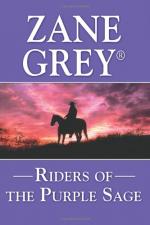Then, weak and spent, she lay thinking, not of the oppression that would break her, but of this new revelation of self. Until the last few days there had been little in her life to rouse passions. Her forefathers had been Vikings, savage chieftains who bore no cross and brooked no hindrance to their will. Her father had inherited that temper; and at times, like antelope fleeing before fire on the slope, his people fled from his red rages. Jane Withersteen realized that the spirit of wrath and war had lain dormant in her. She shrank from black depths hitherto unsuspected. The one thing in man or woman that she scorned above all scorn, and which she could not forgive, was hate. Hate headed a flaming pathway straight to hell. All in a flash, beyond her control there had been in her a birth of fiery hate. And the man who had dragged her peaceful and loving spirit to this degradation was a minister of God’s word, an Elder of her church, the counselor of her beloved Bishop.
The loss of herds and ranges, even of Amber Spring and the Old Stone House, no longer concerned Jane Withersteen, she faced the foremost thought of her life, what she now considered the mightiest problem—the salvation of her soul.
She knelt by her bedside and prayed; she prayed as she had never prayed in all her life—prayed to be forgiven for her sin to be immune from that dark, hot hate; to love Tull as her minister, though she could not love him as a man; to do her duty by her church and people and those dependent upon her bounty; to hold reverence of God and womanhood inviolate.
When Jane Withersteen rose from that storm of wrath and prayer for help she was serene, calm, sure—a changed woman. She would do her duty as she saw it, live her life as her own truth guided her. She might never be able to marry a man of her choice, but she certainly never would become the wife of Tull. Her churchmen might take her cattle and horses, ranges and fields, her corrals and stables, the house of Withersteen and the water that nourished the village of Cottonwoods; but they could not force her to marry Tull, they could not change her decision or break her spirit. Once resigned to further loss, and sure of herself, Jane Withersteen attained a peace of mind that had not been hers for a year. She forgave Tull, and felt a melancholy regret over what she knew he considered duty, irrespective of his personal feeling for her. First of all, Tull, as he was a man, wanted her for himself; and secondly, he hoped to save her and her riches for his church. She did not believe that Tull had been actuated solely by his minister’s zeal to save her soul. She doubted her interpretation of one of his dark sayings—that if she were lost to him she might as well be lost to heaven. Jane Withersteen’s common sense took arms against the binding limits of her religion; and she doubted that her Bishop, whom she had been taught had direct communication with God—would damn her soul for refusing to marry a Mormon. As for Tull and his churchmen, when they had harassed her, perhaps made her poor, they would find her unchangeable, and then she would get back most of what she had lost. So she reasoned, true at last to her faith in all men, and in their ultimate goodness.




